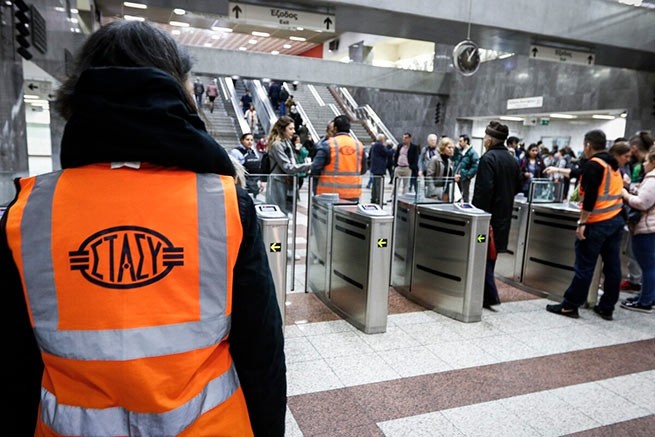The Independence Day of Greece (Greek Ημέρα της Ελληνικής Ανεξαρτησίας), the Day of National Revival of Greece, or March 25 (Greek 25ης Μαρτίου) is a national holiday in Greece. On this day, Greeks and Phyllines honor the heroes of the 1829 Revolution of 1821-29
The holiday coincides with the Orthodox holiday of the Annunciation, which in Greece, according to the Julian calendar, is also celebrated annually on March 25th.
On the eve of the holiday, blue and white flags are hung on the balconies, parades of students and the laying of wreaths at memorials are held in cities. On the day of the holiday, after the morning church service, large-scale military parades are held, the main one being on Syntagma Square in Athens.
2021 marks the 200th anniversary of the revolution. In honor of this event, distinguished guests were invited to the country and a parade was appointed, albeit without spectators, but with many officials.
Reference:
March 25 is a special day for all Greeks, as it unites two great holidays at once, the Annunciation and the Independence Day of Greece. These two holidays have a closer connection with each other than it might seem at first glance. The very name “Annunciation” speaks for itself. It is symbolic that this very day became one of the main national holidays for the Greeks.
In 1821, on March 25, Metropolitan German of the Greek city of Patras blessed the banner of the Greek national uprising against the Ottoman yoke. This was followed by another 11 years of bloody struggle before the Constantinople Peace Treaty approved Greece as an independent state. And yet, despite the fact that military happiness for the Greeks had its ups and downs, it is March 25 that is considered to be the starting point of Greek independence.
The banner consecrated by Metropolitan Herman was a white cloth with a blue cross in the middle. It was soon adopted as the official flag of Greece and is still used by the Greek navy today. As for the rest of the country’s structures, several decades ago they switched to the more familiar version of the Greek flag to us today: nine white and blue stripes with a white cross in the upper left corner. According to the most common version, nine stripes symbolize nine syllables of the slogan of the fighters for independence: “Freedom or death” (gr. E-lef-te-ri-ya and ta-na-tos), and the cross – Christianity, as the state religion of Greece.
The Kleftas (literally “thieves”) are considered the national heroes of the struggle for Greek independence. These are partisan detachments of an anarchist nature, which “descended from the mountains”, striking surprise attacks on the enemy army. It cannot be denied that subsequent generations, for educational purposes, significantly ennobled the two-faced appearance of the Klefts, but the winners are not judged … Perhaps the most prominent figure among this warlike tribe is the hereditary Kleft Theodoros Kolokotronis, whose monuments can be found in almost all major cities of Greece.
Among the modern Slavs, little is known about the fact that Russia and Ukraine are directly related to the preparation of the Greek uprising. After all, it was in Odessa that the secret community Filiki Eteria (gr. “Society of Friends”) was founded, the purpose of which was to create an independent Greek state. Let’s not be honest: the community mainly consisted of young people of Greek origin, but there are also known philhellene heroes (gr. “Friends of the Greeks”) among the brothers of the Slavs. Together with the native Greeks, they went to liberation operations, sometimes doomed to defeat in advance, and shed their blood for the “Great Idea” – the freedom and independence of Greece.
Nowadays, the Annunciation and Independence Day in Greece are celebrated very widely. Parades are held throughout the country, schoolchildren prepare plays and performances on the Greek-Turkish theme, and learn patriotic songs. According to the existing tradition, cod (gr. Bacallaros) is commonly eaten on this day. Everyone, young and old, eats it, but not even all Greeks remember why!
The fact is that this day always falls on the period Great Lentwhen the fasting people deny themselves not only meat, but also fish. But the Feast of the Annunciation (March 25, new style) allows a slight indulgence and allows the presence of fish on the lean table. The question remains, why of all the fish, it is cod (bakaliaros) that has received such an honor? The answer is extremely simple: not everyone was lucky to live close to the sea and have constant access to fresh fish – in some regions, fish had to be transported from afar. And of all the types of Mediterranean fish, it is cod that tolerates transportation and long-term storage outside the refrigerator as well as possible, which has long made it an indispensable dish on this holiday.






More Stories
The Olympic flame will arrive in Athens on Saturday. Which roads will be blocked?
A participant in the Olympic Truce Road race has died
Metropolitan Seraphim spoke out against celebrating Easter together with Catholics